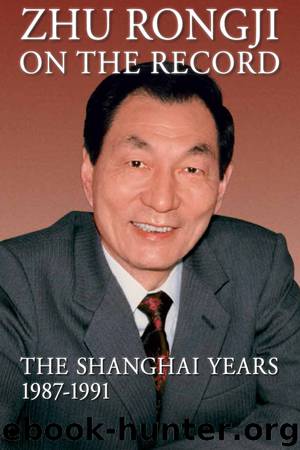Zhu Rongji on the Record by Rongji Zhu

Author:Rongji Zhu
Language: eng
Format: epub
Publisher: Brookings Institution Press
1. This is an address Zhu Rongji televised to the people of Shanghai.
2. The “three papers and two stations” were Liberation Daily, Wenhuibao, Xinmin Evening News, Shanghai People’s Radio, and Shanghai TV.
54
FURTHER CONSOLIDATE SHANGHAI’S STABILITY1
JUNE 13, 1989
Since June 9, the situation in Shanghai has changed markedly.
The First Phase
Beginning on June 9, the situation in Shanghai improved rapidly, and great changes took place, not only here but also in Beijing, which gradually stabilized.
Mobilization of the People. A significant factor in the city’s turnaround was that the vast majority of our people united under the slogan, “Keep Shanghai stable, keep the overall situation stable, continue with production and ensure livelihoods.” We can say that we had the support of over 90% of the people. Our working class, in particular, had already organized, and what’s more, its spirit was unprecedentedly high. We have received many letters these past few days, some from entire families, some from a workshop, a store, or a research institute; there was even one signed “An old silver-haired warrior.” Many colleagues said they shed tears as they read these letters, and I, too, cried as I read them. Because the people were organized and united as one, we were able to send 100,000 in worker patrols onto the streets in a timely way. They removed the roadblocks, and traffic resumed in short order. By yesterday, all of the 1,000 damaged buses had been repaired.
The main reasons we were able to obtain such results during this serious rioting in Shanghai were the clear instructions and appropriate policies of the Party Central Committee and the State Council. Jiang Zemin spoke with me by phone every day and relayed instructions from central leaders in timely fashion, so our general direction was very clear. In a conversation at the most dangerous moment, he said, “Don’t place your hopes in using troops—you must mobilize the people.” That’s why I made it very clear in my televised address that we wouldn’t be using troops. If I hadn’t said so at the time, we wouldn’t have been able to mobilize the workers so quickly because everyone would think, “If you’re going to use the army, what do you want our worker patrols for?” If we had used troops and then mobilized workers, I’m afraid the workers wouldn’t have come.
At the time, several leaders of tertiary institutions felt their work was very difficult and urged the Municipal Party Committee to impose martial law. Had we not clearly stated our determination to avoid using troops, it would have been very hard to mobilize the people. That decision has now proved to be very popular. Many people have written to say that it was indeed correct not to use the army and to rely on the working class. Everyone felt at ease and stepped forward enthusiastically. With worker patrols at the front line and with public security police and armed police backing them up, the problem was solved. At the same time, there was a significant change in the climate in Beijing during those two days.
Download
This site does not store any files on its server. We only index and link to content provided by other sites. Please contact the content providers to delete copyright contents if any and email us, we'll remove relevant links or contents immediately.
| Anthropology | Archaeology |
| Philosophy | Politics & Government |
| Social Sciences | Sociology |
| Women's Studies |
The Secret History by Donna Tartt(19090)
The Social Justice Warrior Handbook by Lisa De Pasquale(12190)
Thirteen Reasons Why by Jay Asher(8910)
This Is How You Lose Her by Junot Diaz(6887)
Weapons of Math Destruction by Cathy O'Neil(6281)
Zero to One by Peter Thiel(5802)
Beartown by Fredrik Backman(5755)
The Myth of the Strong Leader by Archie Brown(5508)
The Fire Next Time by James Baldwin(5446)
How Democracies Die by Steven Levitsky & Daniel Ziblatt(5219)
Promise Me, Dad by Joe Biden(5153)
Stone's Rules by Roger Stone(5088)
A Higher Loyalty: Truth, Lies, and Leadership by James Comey(4964)
100 Deadly Skills by Clint Emerson(4926)
Rise and Kill First by Ronen Bergman(4789)
Secrecy World by Jake Bernstein(4753)
The David Icke Guide to the Global Conspiracy (and how to end it) by David Icke(4720)
The Farm by Tom Rob Smith(4514)
The Doomsday Machine by Daniel Ellsberg(4490)
